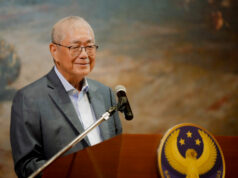Film fest focuses on idea of place
FOR ITS third year, the Tingin ASEAN Film Festival focuses on the “notion of place” as it presents 10 films from the Association of Southeast Nation member countries.
“[It’s about] how people and individuals make home places, how their places are disrupted or invaded, how they are displaced, and how they make new places out of inhospitable situations or fight for their places. All these are themes [that] resonate across Southeast Asia,” said Patrick Campos, festival director, in a statement.
The festival, which runs from Sept. 26 to 29 at the Red Carpet Cinema of Shangri-La Plaza Mall, formally opens with Graves Without a Name (2018) by Rithy Panh, a Cambodian documentary film which explores grief and loss under the Khmer Rouge in Cambodia.
“Panh had lost most of his family under the violent regime, and in this film, he searches a path to peace,” the statement said.
In Aqerat (2017) by Malaysian director Edmund Yeo, we see a woman juggling odd jobs at the Thai-Malaysian border to survive, even if that means being a human trafficker. The film won Mr. Yeo the Best Director award at Tokyo International Film Festival. “The film presents a sweeping tale of displacement and morality in contemporary Malaysia,” the release said.
From the Philippines comes Baboy Halas (2016) by Bagane Fiola. The film shows the struggles of a Matigsalug indigenous family in resisting the pressure to adopt mainstream customs. The film won the NETPAC Jury Prize at the QCinema Film Festival and Best Cinematography from the Young Critics Circle.
By The River (2013) by Thai filmmaker Nontawat Numbenchapol is documentary about the Karen indigenous people in a village and their struggle against a mineral processing company.
Vietnamese film Love Man, Love Woman (2007) by Nguyen Trinh Thi is about a spirit medium in Hanoi and explores how effeminate and gay men in Vietnam have established connections and found a venue for expression under the tenets of the country’s popular Mother Goddess Religion.
Sokola Rimba (2013), a documentary by Indonesia’s Riri Riza, captures the struggles of the Orang Rimba people in protecting their way of life.
Another documentary, In Exile (2016), this time from Myanmar director Tin Win Naing, follows a refugee as he follows migrants who escaped from the Myanmar civil war towards the Thai border where they essentially work on plantations as slaves.
Sayang Disayang (2013) by Sanif Olek is said to be Singapore’s first locally made Malay-language film since its independence from Malaysia in 1965. The drama is about an Indonesian live-in nurse who works for a lonely and bitter Singaporean elder. To appease him, the nurse tries to replicate a sambal goreng dish the elder’s late wife used to cook for him.
From Laos comes The River Flows (2016) by Makoto Kumazawa. The Lao-Japanese co-production is about a woman who accidentally travels back in time to 1960s Laos and meets a Japanese man in Laos for a dam construction survey. The film was produced to commemorate the 60th anniversary of Lao-Japanese friendship.
Anggur in Pockland (2017) from Brunei is an arthouse film by Abdul Zainidi about strange magical grapes that visit those without purpose in life and transport them to the magical, worry-free realm of “Pockland.”
Brillante Ma. Mendoza’s Thy Womb (2012) will have a special screening. The film is about a woman who, failing to get pregnant a third time, embarks on a search for a second wife who can bear a child for her husband.
“Tingin is the country’s only film festival dedicated to Southeast Asian cinema. This year, indigenous peoples, who inhabit but the fringes of popular imagination, will take center stage. We hope that by immersing moviegoers in the stories of indigenous peoples, the festival contributes to surfacing the increasingly precarious plight of indigenous peoples. Indigenous peoples are being discriminated against, and their ancestral domains are under siege from vested interests. We hope Tingin enriches the perspectives of moviegoers about indigenous cultures and wins their support for indigenous peoples,” said Maya Quirino, Tingin festival director.
Aside from the film screenings, the festival will also be holding lectures on the art of watching movies and on indigenous people and their representation in the Philippine cinema.
Tingin ASEAN Film Festival will run from Sept. 26 to 29 at the Shangri-La Plaza Mall Red Carpet Cinema. Admission is free. For the complete screening schedule follow Tingin ASEAN Film Festival on Facebook. — Zsarlene B. Chua



